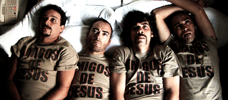Reviews
Capitaine Achab
Philippe Ramos
France, 2007
Credits
Review by Tom Huddleston
Posted on 18 October 2007
Source 35mm print
Categories The Times BFI 51st London Film Festival
Literary prequels are all the rage. From James Bond to Hannibal Lecter, the origin stories of our favourite (or at least bestselling) fictional characters seem to be everywhere. At first glance, Melville’s Captain Ahab seems the perfect candidate for such treatment—an obsessive, conflicted character whose backstory is only partially sketched in the original source novel, giving us the chance to explore the history and inner life of a tortured, iconic figure. And so it should have been, if writer-director Ramos (adapting both from Melville’s novel and his own 2004 short) hadn’t squandered that opportunity at every turn, turning what might have been a fascinating psychological study-cum-riproaring sea adventure into a perplexing, episodic ramble which manages to skim over most of the interesting events in the character’s life.
As a film, Captain Ahab is almost a caricature of modern French cinema: literary, pretentious, handsomely mounted and beautifully photographed, and gratuitously obsessed with sex. Opening - for no apparent reason - with a shot of a dead woman’s pubic hair, the first half of the film follows the ten-year-old Ahab from his mother’s death to his father’s, and on into the wider world. The film is constructed in five chapters, each narrated by a different figure in Ahab’s life—an intriguing conceit, and one which works, for the most part. We get to experience the character through others’ eyes, opening up this otherwise rather taciturn figure.
But the story these chapters tell is not so well judged. The first is narrated by Ahab’s father, a terse, rough-handed woodsman who inexplicably finds himself in a spicy relationship with a bawdy, beautiful farm girl less than half his age. But she inevitably cheats on him, leading to his demise. Ahab is then shuffled off to his aunt, an old maid in the throes of her first sexual relationship, whose cries of delight echo through into Ahab’s bedchamber. All this fornication seems to have absolutely no bearing on the story, it never seems to impact on the young Ahab, but it seems terribly important to the director—he lingers over shots of exposed breasts and pouting lips, throws in random dream-shots of naked bodies. No doubt there’s some Freudian-psychological justification for it all lurking in Ramos’ psyche somewhere, but it’s far from clear to the audience.
Next, a reprieve from all the coupling, as Ahab flees his aunt’s house and heads for the wild. Here the story takes a sharp turn away from Melville and makes a beeline for Mark Twain territory, as Ahab comes up against two ruffians, one of whom introduces himself as European royalty, as 19th century rivergoing vagabonds seem obliged to do. They leave the boy for dead, until he is taken in by kindly priest Mulligan, who opts to raise him in the sight of God.
And here the script makes its most unexpected and bizarre decision. We flash forward some thirty years, to pick up the story of Ahab as a grown man, and a sea captain who has already lost his leg. Yes, the key event in the character’s life not depicted in ‘Moby Dick,’ the losing of his leg and the start of his obsession with the white whale, is not shown, and barely alluded to. Skipping Ahab’s adolescence, his years as a young seaman, his rise to the rank of Captain, all these choices are peculiar but ultimately forgivable. But to ignore the single most important event in the character’s life just seems, from a storytelling perspective, nonsensical and self destructive.
The fourth chapter details Ahab’s recovery from the unseen event, the crafting of his first prosthetic and his affair with a beautiful widow, who surprisingly manages to keep her clothes on. But the lure of the sea is too strong, and soon Ahab is back at the helm of the Pequod for a showdown with the whale. This final section of the film, retelling the events of ‘Moby Dick’ from the perspective of both Ahab and his first officer Starbuck, is a complete mess. Up to this point, the film has been ridiculous, but unpredictable and consistently entertaining. Here Ramos loses the plot entirely, throwing in a bizarre stock-footage sequence completely at odds with the classical style he has so far developed, exposing the film’s budgetary limitations with a laughable and perfunctory climactic whale-hunt sequence.
There’s no arguing that Captain Ahab is a ravishing film to look at. The photography is lush and vibrant, the European locations (standing in for New England) wonderfully chosen. Light and shadow are used to entrancing effect, and however unnecessary those naked bodies might seem, they never look anything less than perfect—there’s a painter’s eye at work here, and Ramos the director shows tremendous promise. But none of this can subtract from the frankly bizarre choices Ramos the writer insists on making. Of the five episodes, only the first contains any serious drama, from there things become steadily less interesting. The boyhood sequences have a certain lyrical, Tom Sawyer-ish charm, but to keep the focus of the film for most of its first hour on a tightlipped ten-year-old starves us of an identity figure. And when we pick up the story again Ahab has already transformed into a closed, angry man, with little hint of how he got there. So as the film drags towards it’s inevitable conclusion, the overriding sensation is of frustration and dismay at the sheer wrongheadedness of this seemingly creditable venture.
As a final note it must be added that, for an English speaking audience at least, the film is worth watching if only to hear how the French accent tackles the word ‘Nantucket.’
More The Times BFI 51st London Film Festival
-

Island of Lost Souls
2007 -

Garage
2007 -

Exodus
2007 -

Friends of Jesus
2007 -

We Want Roses Too
2007 -

The Trap
2006 -

Captain Ahab
2007 -

Shotgun Stories
2007 -

Savage Grace
2007 -

The Assassination of Jesse James by the Coward Robert Ford
2007 -

The World Unseen
2007 -

Things We Lost In The Fire
2007 -

Lions for Lambs
2007 -

Talk to Me
2007 -

Redacted
2007 -

Battle For Haditha
2007 -

Chaotic Ana
2007 -

Angel
2007 -

Juno
2007 -

Fay Grim
2006 -

Reservation Road
2007 -

I’m Not There
2007
We don’t do comments anymore, but you may contact us here or find us on Twitter or Facebook.



